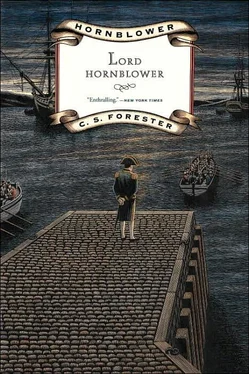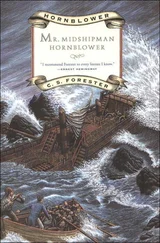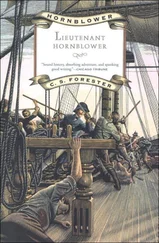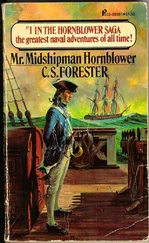Where the tracks crossed a man was waiting for them, a connecting file that Brown, like a prudent officer, had left behind so as to leave the main body in no doubt about which track he was following; as they came up he turned and pointed to something hanging beside the trail—something grey and white. It was the dead body of a man, clothed in peasant’s dress, hanging by his neck from a pine-tree limb; the white colour was a large printed placard fastened to his chest.
“Frenchmen of the Nivernais!” it said. “With my arrival at the head of a large body of troops all foolish attempts to resist the Government of our august Emperor Napoleon must cease forthwith. It is gratifying to me to find that so poor a reception has been given to the Count de Graçay’s insane attempt to oppose the Emperor, recalled to his throne by the supplication and suffrages of forty million of his loyal subjects. Yet some unfortunate people have been deluded into taking up arms.
“Know, therefore, I am instructed by the clemency of His Imperial Majesty to proclaim that any Frenchman, with the exceptions mentioned below, who hands in his arms and makes personal surrender to any troops under my command before fifteen days from the date of this proclamation will receive amnesty and pardon. He will be free to return to his farm, to his shop, to the bosom of his family.
“Anyone remaining in arms will receive sentence of death, to be carried out immediately.
“Any village offering shelter to the rebels will be burned to the ground, and its leading inhabitants shot.
“Any person giving assistance to the rebels, whether by acting as guide or by giving them information, will be shot.
“Exceptions to the amnesty. The above-named Count de Graçay. His daughter-in-law, known as the Vicomtesse de Graçay. With them are included the Englishman, known as Lord Hornblower, who is required to pay for a life of outrage and crime.
“Signed,
emmanuel clausen, Count, General of Division.
June 6th, 1815.
The Count looked up at the blackened face of the corpse.
“Who is it?” he asked.
“Paul-Marie of the mill, sir,” said the man who had waited for them.
“Poor Paul-Marie!”
“So they have crossed this track already,” said Hornblower. “We’re round behind them.”
Somebody reached up a hand to the corpse, perhaps to tear off the placard.
“Stop!” said Hornblower, just in time. “They must not know that we have come this way.”
“For the same reason we must leave the poor devil un-buried,” said the Count.
“We must keep marching,” said Hornblower. “Once over the ford and we shall have time to take breath.”
He looked round at his pitiful little army. Some of them, at the moment of halting, had sunk to the ground. Some were leaning on their muskets, and some were spelling out the placard that hung on the breast of the dead Paul-Marie. It was not the first copy of it they had seen.
“Come on, my children,” said the Count.
The old man’s face was white with weariness, and he drooped in his saddle; the wretched horse he rode was hardly in better condition, moving forward reluctantly with hanging head at the prod of the spurs. Shambling, hungry, and ragged, the others followed him, most of them looking up at the dead Paul-Marie as they passed. Hornblower noticed some who lingered, and dropped back to be with them; he had pistols in his belt. Deserters, as well as being a loss of strength, would give information of their intention to cross the ford. Clausen had scored a distinct point with his offer of amnesty, for there were many in the band—Hornblower could list in his mind a number of them—who must already be wondering whether it was worth going on with the struggle. Men with nothing save certain death ahead of them fight far harder in a losing battle than those with a chance to surrender, and his followers must be thinking regretfully of the rapid passing of the fifteen days allowed them in the proclamation. This was June 18th—Sunday, June 18th, 1815. He had to keep his men together for three more days to make sure that they would fight on with their necks at stake.
His blistered feet were causing him agony, for the short pause beside Paul-Marie’s hanging body had brought back the life into them, and he would have to walk on them for some distance farther before they would be numb again. He had to drive himself to quicken his stride to catch up Marie, walking in the middle of the group with a musket slung across her back and Annette beside her. Marie had cut off her masses of hair—sawed them off with a knife after her first night as a guerrilla soldier—and the ends hung irregularly round her face, which was wet with sweat and streaked with dirt But both she and Annette were in far better physical condition than Hornblower, stepping out with unblistered feet and still with a certain freedom of stride as compared with Hornblower’s leg-weary stagger. They were ten and fifteen years younger than he.
“Why not leave Pierre behind and take his horse, ‘Oratio?” asked Marie.
“No,” said Hornblower.
“He will die anyway,” argued Marie. “That wound will gangrene.”
“Bad for the other men to leave him here to die alone in the forest,” said Hornblower. “Besides, Clausen might find him before he died and find out from him what we intend to do.”
“Kill him and bury him, then,” said Marie.
Women when they go to war are fiercer than men and inclined to carry the logic of war to still greater logical extremes. This was the tender, gentle Marie, the kind and understanding, who had wept for love of him.
“No,” said Hornblower again. “We’ll capture some more horses soon.”
“Providing we do,” said Marie.
It was hard to keep horses alive in these conditions; they died or went lame while men still lived and marched. Only two weeks had passed since Clausen, marching down from Briare, had forced them to evacuate Nevers, and in the fierce manhunts that had followed horses had died in dozens. Clausen must be an active and energetic officer; his columns had marched hotfoot after them in unceasing pursuit. Only night-march after night-march, stratagems and cunning, had kept them out of his clutches. Twice there had been fierce little rearguard actions; once they had ambushed a troop of pursuing Hussars—Hornblower remembered the gaily-uniformed soldiers tumbling from their saddles as the volley blazed from the roadside—and now here they were with half their strength gone already, marching by day, having marched the night before, to cross the rear of one of Clausen’s circling columns. Marie knew of a dangerous and little-known ford across the Loire ahead. Once over that they could rest for a day in the forest of Runes before showing themselves in the valley of the Allier and causing fresh turmoil there. Clausen would be after them at once, but that was far enough to look ahead; the next move would depend on the new circumstances.
Active and energetic Clausen certainly was—he must have learned about fighting guerrillas in Spain. But he had a considerable force to back him up; Hornblower knew of the 14th Leger and the 40th Ligne—the 14th Light Infantry and the 40th of the Line—and there was another regiment with which he had not yet come into contact, and at least one squadron of the 10th Hussars. Nine battalions or more—six or seven thousand men—all chasing his ragged thirty. He was doing his duty, for those seven thousand men could be better employed on the Belgian frontier, where undoubtedly some action was stirring. And if he could only keep up the struggle he could wear down even those seven thousand men, wear out their boots and wear down their spirits. He could! Hornblower gritted his teeth and marched on; his feet were numb again now and had ceased to pain him. Only the terrible weariness in his legs distressed him now. He became aware of a low muttering roar in the distance. “Guns?” he asked, a little puzzled. “Thunder,” said Marie.
Читать дальше









